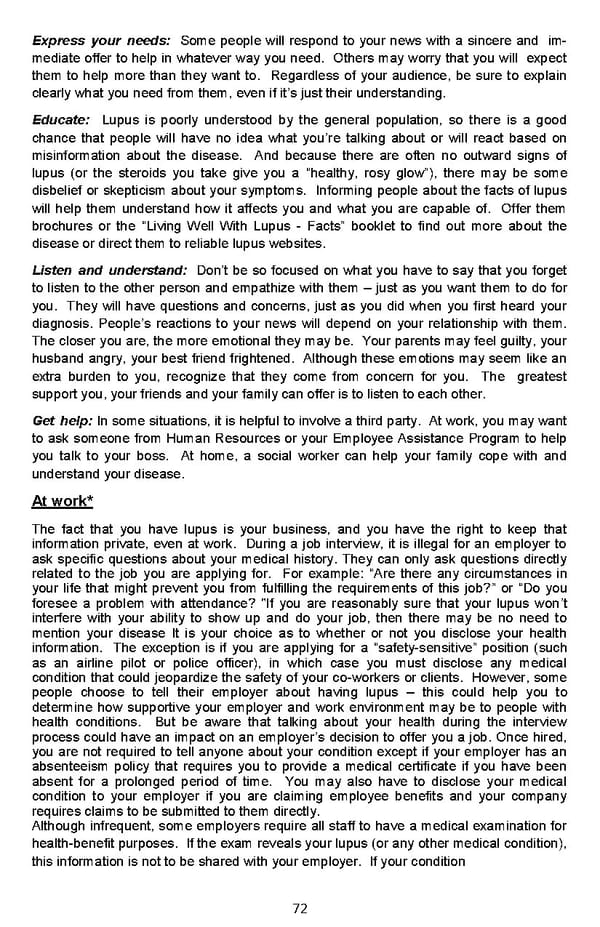Express your needs: Some people will respond to your news with a sincere and im- mediate offer to help in whatever way you need. Others may worry that you will expect them to help more than they want to. Regardless of your audience, be sure to explain clearly what you need from them, even if it’s just their understanding. Educate: Lupus is poorly understood by the general population, so there is a good chance that people will have no idea what you’re talking about or will react based on misinformation about the disease. And because there are often no outward signs of lupus (or the steroids you take give you a “healthy, rosy glow”), there may be some disbelief or skepticism about your symptoms. Informing people about the facts of lupus will help them understand how it affects you and what you are capable of. Offer them brochures or the “Living Well With Lupus - Facts” booklet to find out more about the disease or direct them to reliable lupus websites. Listen and understand: Don’t be so focused on what you have to say that you forget to listen to the other person and empathize with them – just as you want them to do for you. They will have questions and concerns, just as you did when you first heard your diagnosis. People’s reactions to your news will depend on your relationship with them. The closer you are, the more emotional they may be. Your parents may feel guilty, your husband angry, your best friend frightened. Although these emotions may seem like an extra burden to you, recognize that they come from concern for you. The greatest support you, your friends and your family can offer is to listen to each other. Get help: In some situations, it is helpful to involve a third party. At work, you may want to ask someone from Human Resources or your Employee Assistance Program to help you talk to your boss. At home, a social worker can help your family cope with and understand your disease. At work* The fact that you have lupus is your business, and you have the right to keep that information private, even at work. During a job interview, it is illegal for an employer to ask specific questions about your medical history. They can only ask questions directly related to the job you are applying for. For example: “Are there any circumstances in your life that might prevent you from fulfilling the requirements of this job?” or “Do you foresee a problem with attendance? "If you are reasonably sure that your lupus won’t interfere with your ability to show up and do your job, then there may be no need to mention your disease It is your choice as to whether or not you disclose your health information. The exception is if you are applying for a “safety-sensitive” position (such as an airline pilot or police officer), in which case you must disclose any medical condition that could jeopardize the safety of your co-workers or clients. However, some people choose to tell their employer about having lupus – this could help you to determine how supportive your employer and work environment may be to people with health conditions. But be aware that talking about your health during the interview process could have an impact on an employer’s decision to offer you a job. Once hired, you are not required to tell anyone about your condition except if your employer has an absenteeism policy that requires you to provide a medical certificate if you have been absent for a prolonged period of time. You may also have to disclose your medical condition to your employer if you are claiming employee benefits and your company requires claims to be submitted to them directly. Although infrequent, some employers require all staff to have a medical examination for health-benefit purposes. If the exam reveals your lupus (or any other medical condition), this information is not to be shared with your employer. If your condition 72
 Living Well With Lupus Facts Booklet Page 71 Page 73
Living Well With Lupus Facts Booklet Page 71 Page 73